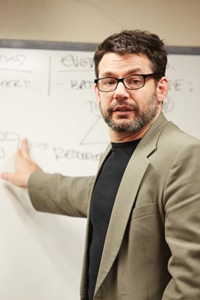
Kelly Davidson
Duncan Watt
Position
Assistant Professor
Affiliated Departments
Telephone
617-747-6435
Personal Websites
For media inquiries, please contact Media Relations
Career Highlights
- Founder of Fastestmanintheworld Media
- Video game scoring work includes Bioshock Infinite (Irrational/Take-Two), League of Legends (Riot Games, 1.2 billion play hours/month), Need for Speed Undercover (EA/Black Box), Stargate Online TCG (Sony), Brothers in Arms: Hell's Highway (Ubisoft/Gearbox), and many others. Served as audio lead on League of Legends at launch, and was senior composer/audio designer at 38 Studios (Kingdoms of Amalur, Project Copernicus)
- Music is featured in movie Now You See Me; television shows The Good Wife (ABC), NCIS (CBS), Any Day Now (Lifetime); and My Little Pony; and Transformers toys and apps
- Clients include Ubisoft, EA, Sony Online, Take-Two, Hasbro, NCsoft, Lionsgate, Irrational, Riot, more
- Voice of popular game characters Rammus and Blitzcrank (League Of Legends, voiceover work includes Auto Assault (NCsoft), Pirates CSG Online (Sony), and others
- Senior composer/audio designer, 38 Studios (2010–2012)
- Appears on more than 70 album projects as musician, producer, or recording engineer
- Speaking engagements include 2013 Game Developers Conference, 2012 Montreal International Games Summit, 2012 AES NYC, and colleges such as Yale and Brandeis
In Their Own Words
